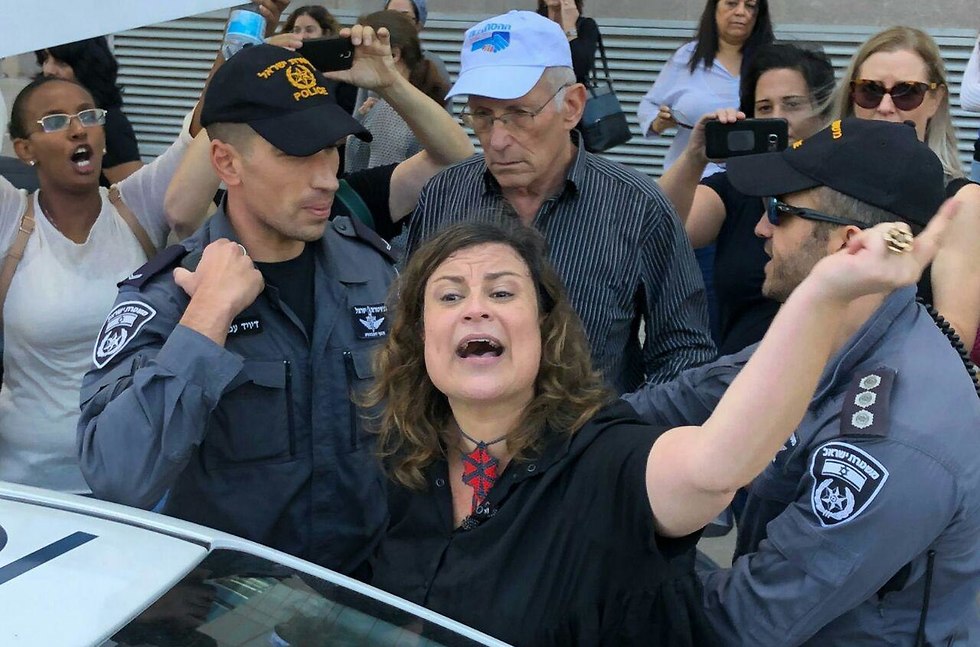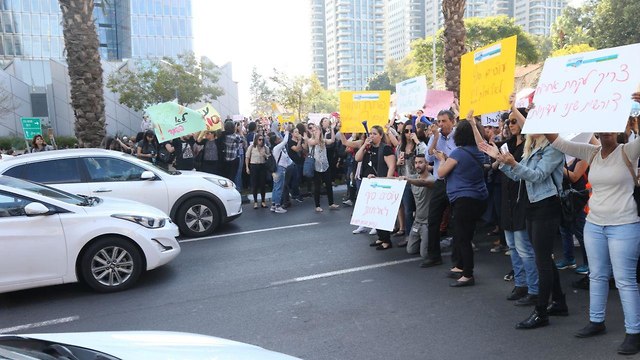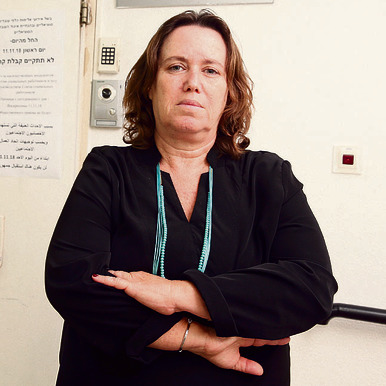
Social workers protest in Tel Aviv
Social workers protest work under constant threat
Social workers say they face grave violence on a daily basis while police close assault cases due to 'lack of public interest'; they demand security measures at their workplaces, as well as more manpower to deal with the workload.
When Ben Gurion Airport is on strike, Israel comes to a halt. But when the social workers, who deal with the country’s most difficult welfare cases, decide to strike in protest of the violence they are subject to on a regular basis—the public is indifferent.
The social workers' strike has entered its second day. Some 1,000 social workers and their supporters blocked the Azrielly Junction in Tel Aviv on Monday for 40 minutes. Earlier, hundreds of protesters briefly blocked the entrance to Jerusalem.
The social workers—help the elderly, Holocaust survivors and disabled youths—have to contend with serious violence in a near-impossible work environment. The strike was launched after a social worker was attacked and her car was vandalized with a hammer.
The attacker’s lawyer said that, “this is a very sad case of a woman who faces difficult circumstances, her four-year-old daughter was taken away from her to a foster home, and she fears the girl is being abused there. All her attempts to get answers from welfare bodies were ignored.”
Social workers are also protesting against their workload and the insufficient manpower that causes it. They are demanding a safe work environment that includes security measures—such as CCTV, metal detectors and guards—as well as self-defense training for emergency situations. The social workers also demand that police investigations into attacks against them are no longer closed due to "lack of public interest."
Municipalities, meanwhile, have decided not to pay the workers on strike. “They think they can scare the workers off, while they are there fighting for their lives,” said Inbal Hermoni, head of the Social Workers Union.
“We demand that the Welfare and Social Services Ministry and the Finance Ministry find an immediate solution for the raging violence. There will be no public services until appropriate solutions are found for the insufficient manpower, the workload, and the safety issues.”
“The state sent us to take care and protect helpless people, and it’s the state’s role to protect us. As long as this doesn’t happen—we will not receive the public at our offices. We refuse to send social workers to their death,” Hermoni added.
The Welfare and Social Services Ministry said in response that “The ministry views any violence against social workers as very grave. Social workers do their jobs faithfully and should feel safe at work. The latest incident has to do with a woman who has threatened the lives of social workers before and was even arrested, but unfortunately law enforcement authorities did not work to keep her away.”
The ministry added it has increased the budget for security at social workers' offices and works to fight shaming of social workers on the social media.
“We’ve been exposed to physical and verbal violence throughout the years, but there has been a rise in incidents this year. It’s a mirror image of our society, which has become more violent,” said Meira Kiperman, director of the Social Work and Welfare Department in the Haifa municipality.
Last week, Kiperman said, two of her social workers “went on a house call, they had a warrant to protect a 14-year-old minor whose welfare was in serious danger. When they arrived at the house, stones were thrown at them… One social worker received death threats to her and her family.”
Kiperman added that the state doesn’t invest enough in the safety of the social workers. “Enforcement is lacking, violent people are often released without being brought to justice. Investigation cases are closed due to lack of public interest.”
Orly Maestro has been a social worker for 13 years and now heads social services in the Upper Galilee Regional Council. “We face verbal abuse, sometimes physical violence and Facebook shaming. Our work involves being under constant threat,” she said, adding she now has a panic button.
“We are tired of being a punching bag,” Maestro continues. “We often have to enter people’s lives uninvited, and encounters are extremely unpleasant. Our mobile phone numbers are available to all at anytime, which often results in harassment, threats and inappropriate messages.”
Y., a 37-year-old social worker from the center of Israel, also experienced violence in her line of work: “I had to call the police more than once when working with families. Just recently we had an incident with a teen who attacked a security guard, threatened employees and broke a computer. We were genuinely afraid for our lives at the office. It’s a common thing, we’re everybody’s punching bag. There’s no law to protect us.”
N., a 30-year-old social worker from the north of Israel, also shares these feelings. “The one case that haunts me took place when a woman, whose ex-husband got custody of their children, called me over and over, screaming. I tried to listen and help, but the screaming turned into threats. It’s not a single event—it’s daily occurrence,” she said.













